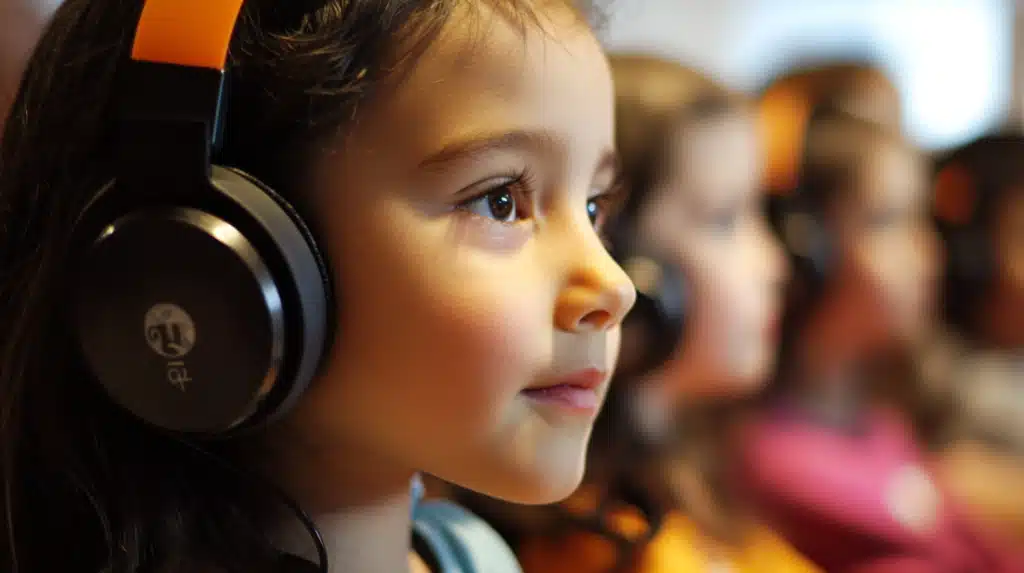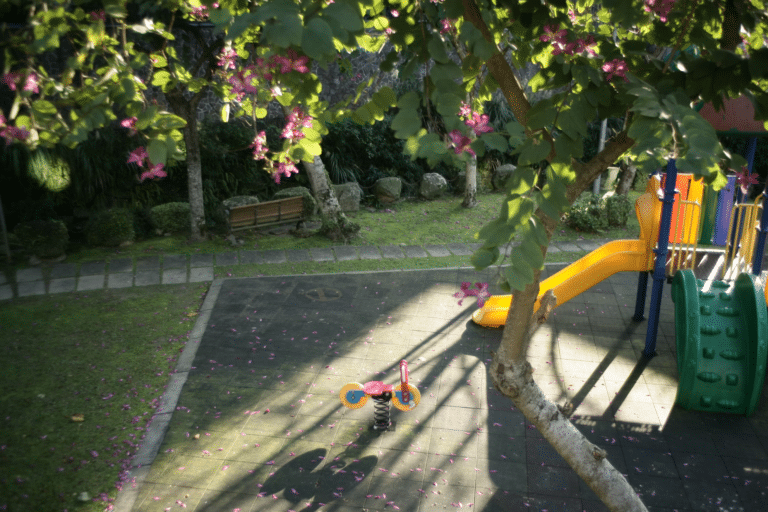Music does more than just sound good—it helps kids think better. Studies show that learning to play an instrument strengthens brain connections, making it easier to remember things and solve problems. When kids read musical notes and turn them into movement, multiple parts of the brain work together, improving mental agility and focus.
Music also sharpens language skills. Recognizing different pitches and rhythms trains the brain to process speech more effectively. Research suggests that children with musical training tend to have an easier time learning new words, improving their reading skills, and even picking up other languages faster.
As Delphian School notes in its article on the benefits of music education, “music can be ‘language’ in a … literal sense. That capability, which often develops at a very young age, spills over into vernacular language acquisition too.”
Math and music go hand in hand. Understanding rhythm and musical structure involves counting, recognizing patterns, and working with fractions. In fact, studies have found that kids involved in music often perform better in math because they develop strong problem-solving abilities and analytical thinking.
Also, according to experts at Delphian School and other institutions, music teaches skills that help kids in everyday life. Learning an instrument takes patience, concentration, and discipline. Practicing regularly — at least 45 minutes per day, five days a week, according to the Colorado Institute of Musical Instrument Technology — builds persistence. Sticking with it gives kids a sense of accomplishment that carries over into other areas of learning.
Emotional and Psychological Benefits
Music is an outlet for self-expression, helping kids process feelings that can be hard to put into words. Whether they’re singing, playing an instrument, or simply listening, music can bring comfort, reduce stress, and improve emotional well-being. Research has even shown that music helps lower anxiety levels and makes it easier for kids to handle their emotions.
Confidence grows with musical ability. Learning a new song, playing in front of an audience, or even just mastering a tricky piece gives kids a sense of pride. They see firsthand how practice leads to progress, which builds self-esteem and a positive attitude toward challenges.
Music also teaches discipline. Sticking to a practice routine requires focus and dedication. These habits don’t just make better musicians—they make better students and lifelong learners. Kids who study music often develop strong time management skills and an ability to set and achieve goals.
“Each day has a set amount of work,” says musician Ryan Beach. “When you finish that work, you can walk away knowing you did what you needed to do that day.”
Outside of individual benefits, music brings joy. It’s a source of happiness, creativity, and relaxation, offering kids a break from the pressures of school and everyday life. Schools with strong music programs often see better overall student morale and fewer behavioral issues.
Social and Behavioral Benefits
Music also opens the door to different cultures. Learning about various musical styles introduces kids to traditions from around the world, helping them appreciate diversity and develop empathy for people with different backgrounds. Exposure to global music broadens views and encourages open-mindedness.
Friendships often form through music. Whether it’s bonding over a favorite song or working on a performance together, music enhances social connections. Research even shows that kids in music programs tend to feel more involved at school and have a stronger sense of belonging.
Music also influences behavior in positive ways. Schools with music programs report fewer disciplinary issues, as students are more likely to stay involved in constructive activities. Playing an instrument or singing requires patience, focus, and cooperation—all skills that contribute to better behavior both inside and outside the classroom.
Music’s Impact on Academic Performance
Students who participate in music tend to do better in school. Research has shown that kids involved in music education often score higher on standardized tests and have better overall grades. The skills they develop—focus, discipline, and problem-solving—carry over to other subjects like math, science, and reading.
Music helps kids focus and stay on task. Learning to play an instrument requires sustained attention, which improves focus in other areas of learning. In today’s world of distractions, having the ability to concentrate for extended periods is an extremely useful skill.
Schools with music programs often see lower dropout rates and higher attendance rates. The attendance rate is about 20% higher, and the dropout rate about 10% lower, at schools with music programs than at those without, according to Children’s Music Workshop.
Indeed, when students have access to creative outlets like music, they tend to be more involved in school and less likely to lose interest. Music gives them something to look forward to, increasing motivation and academic participation.
Music also fosters adaptability. Whether kids are learning a new instrument, improvising during a performance, or adjusting to a new piece, they get comfortable with change and problem-solving. These skills help them handle challenges in school and beyond.
Overcoming Barriers to Music Education
Despite its many benefits, music education often faces budget cuts. Many schools prioritize core subjects like math and science, leaving little funding for the arts. But research shows that music education isn’t just a bonus—it’s an important part of a child’s learning experience. Parents, teachers, and community members can advocate for music programs by highlighting their long-term benefits.
“Having a goal for each practice session is essential, whether your child is practicing for five minutes or a couple of hours each day,” says NPR Classical music expert Anastasia Tsioulcas.
For families worried about cost, there are ways to make music more accessible. Many community organizations and nonprofit groups offer free or affordable music lessons. Libraries, after-school programs, and online resources also provide opportunities for kids to learn music without a hefty price tag.
Parental support makes a difference. Encouraging kids to explore music at home, attending school performances, and promoting local music programs help ensure that music remains a key part of education. When families show interest, schools are more likely to prioritize music programs.
Communities can also step up. Schools partnering with local musicians, arts organizations, and universities can expand access to music education. Programs that bring professional musicians into classrooms or offer mentorship opportunities provide valuable experiences for students.
Final Thoughts
Music isn’t just an extracurricular activity—it’s an essential part of a well-rounded education. It strengthens thinking skills, builds confidence, enhances social connections, and improves academic performance. Schools like Delphian School that invest in music programs give students more than just a creative outlet; they give them tools for success in every area of life.
Ensuring access to music education benefits not just individual students but entire communities. By supporting music programs, parents, educators, and policymakers help shape a future where children can grow academically, emotionally, and socially through the power of music.
















